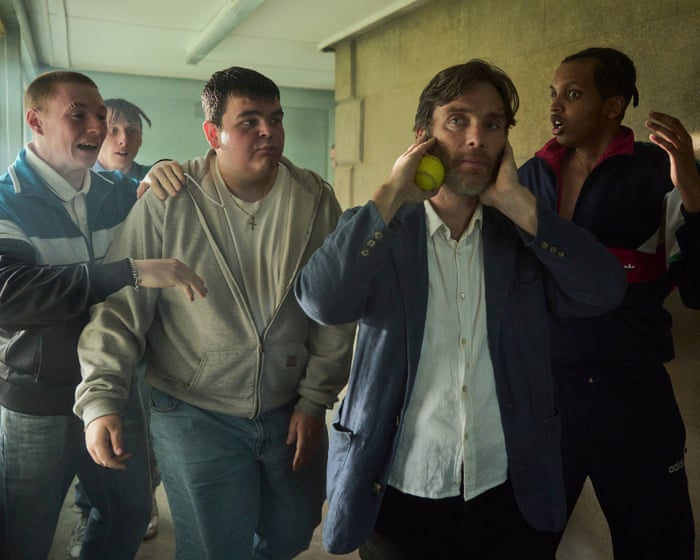Months before his latest book was published, Max Porter went on holiday with Cillian Murphy and a mutual friend. “I told them, ‘I’ve just finished another novel,'” Porter recalls. “And they said, ‘But you only just wrote one.’ I replied, ‘Well, I write them quickly and then edit them slowly.'” He ended up reading the book aloud to them, offering the first look into the jumbled mind of a teenage delinquent named Shy, who lives in a “dilapidated old mansion turned into a school for troubled boys in the middle of nowhere.”
Murphy had become close friends with Porter after starring in a stage adaptation of Porter’s debut novel, Grief Is the Thing With Feathers. Porter wasn’t seeking another collaboration. In fact, he says, “I thought this book was unadaptable because it’s like a weather system inside Shy’s head. I was also a bit concerned about all my work being turned into adaptations.”
Two years later, Shy was published. Meanwhile, Murphy had started his own film company, Big Things, and was “trying to come up with a project” to follow its acclaimed first film, Small Things Like These, which dealt with abusive church-run homes for unmarried mothers in Ireland. “Max and I talk all the time,” Murphy says. Both have sons, and Murphy comes from a family of teachers, while Porter teaches part-time in prisons and spent part of the lockdown mentoring boys who had been excluded from school. They decided they wanted to create something about care. “It wasn’t specifically about masculinity at that point,” Porter explains, “but something related to the care system.”
There was one issue. “While I love Shy as a book,” Murphy says, “I could see it was unadaptable.” However, the novel featured a minor character: the headteacher, Steve, a gentle but background figure. “Then,” Porter continues, “I suggested, ‘What if we focus on Steve and leave the book behind?’ So I started over completely.”
The result is a powerful, expressionistic story set in a last-chance remand school in the 1990s, where overworked and underpaid staff try to help boys society has given up on. It’s both an angry critique of a broken system—gutted by Tory cuts in a previous era—and a testament to why teenagers like Shy, despite their sometimes awful behavior, are worth saving. Shy, for instance, has vandalized a shop, crashed a car, stabbed his stepdad’s finger, and broken someone’s nose.
Porter wrote the screenplay himself—his first—with Murphy starring as the beleaguered headteacher managing a group of unruly boys. The cast included three women: a strict but caring deputy head, a student counselor, and a shy new staff member. Soon, Tracey Ullman, Emily Watson, and Little Simz (Simbiatu Ajikawo) had joined the project.
Casting the students was a bigger task. “We saw 3,500 kids,” Murphy says. One actor stood out for the role of Shy: Jay Lycurgo, who was born in 1998, two years after the film is set. In the mid-90s, his father played for Manchester United but later worked in pupil referral. “When I got the audition email,” Lycurgo says, “I asked my dad if I could visit him. I went to his office and ended up spending a few weeks observing schools.”
I’m interviewing them all in a maze of hotel rooms the morning after the London premiere of Steve. It’s been a hectic few days, with successful premieres also held in Toronto and Cork. “A drama filled with raw energy and the shadow of death…”Peter Bradshaw of this paper described the film as “a brutal chaos of emotional pain, cut with slashes of bizarre black humour.” Peter Debruge from Variety praised it as “a profoundly moving and superbly acted diamond in the rough.”
Max Porter, Cillian Murphy, and director Tim Mielants are in separate rooms, looking tired. Rebecca Ullman is stuck upstairs in bed with a hoarse voice, but Jay Lycurgo and Simbiatu “Little Simz” Ajikawo are together, full of energy and banter. They are amused to find out they both failed to get into the Brit School for performing arts. Ajikawo admits she didn’t even get an audition, while Lycurgo remembers showing up with a tearful monologue he had prepared for his GCSEs and forgetting the first line. “I didn’t get in because I thought acting was just about crying,” he says.
The film takes place over one day and was shot in sequence over 29 days, following a two-week rehearsal period for the young actors to bond. Mielants, who is Belgian and speaks in metaphors, was still finishing post-production on Small Things Like These when he received the script for this film. He notes the stark contrast: while Small Things had “very little dialogue over a lot of silences,” Porter’s script “built a cathedral of words on top of the iceberg. So it was like, ‘Wow. How am I going to do this?'”
He adds that he was going through a midlife crisis at the time, triggered by his father’s Alzheimer’s and his brother’s death, which led him to revisit family videos from the 1990s. “I wanted to see my parents and grandparents again, and I understood the value of seeing them talk directly to the camera.” This influenced the film’s grainy, handheld style and the idea of having each character in the house give a direct-to-camera interview, describing themselves in three words. While the boys are lively, Murphy’s character Steve is emotional and often speechless. “I’m looking at him instead of trying to understand him,” says Mielants, “and that’s where the surrealness comes back.”
The film is partly a love letter to the clashing musical cultures of the 1990s. “Max was sending me all these playlists,” Mielants recalls. “So I was storyboarding while listening to drum ‘n’ bass, which wasn’t my usual music. Then I started seeing things upside down, which felt like getting inside the minds of Steve and the boys. I was 16 in 1996 when that music was popular, and I remember the energy and all those chemicals rushing through your body. I wanted the visuals to capture that feeling.”
The decision to film in sequence over a short period came from Murphy, inspired by his work with Ken Loach on The Wind That Shakes the Barley. Normally, Murphy explains, “I lock myself away for months, reading, walking around, talking to myself, and developing a physicality and a voice. For this role, since I grew up with teacher parents and was a bit of a troublesome kid at school—not malicious, just annoying—I felt I had enough to draw on. And because we were shooting in order, and Steve is always struggling—underfunded, sleep-deprived, with a boy who’s deteriorating—I wanted to stay behind the curve, stumbling over words and desperately trying to hold everything together. I didn’t want to be over-prepared.”
The unspoken subtext of the film is the differences—and similarities—between the mid-1990s and today. While items like dictaphones, Sony Walkmans, and old Renault 5s may seem quaint, issues like the underfunding of the care system and the vilification of young men remain all too relevant.Familiar. “Hopefully, this highlights that the problems these kids face are lifelong,” says Murphy. “They existed before technology, the internet, and social media. These developments have just made them worse.”
Teenage boys often seem easy to dismiss. “I think they’re an easy target, both statistically and ideologically. And certainly in Ireland and the UK, the suicide rate among young men is tragically and staggeringly high,” he adds. Although in person, Lycurgo seems nothing like the troubled character Shy, he understands exactly what Murphy means. “I deal with mental health every day through my own personal struggles,” he says.
At school, Lycurgo was cheeky and easily distracted, more interested in football than studying. It wasn’t until he was 19 that he discovered he had dyslexia and realized he could have benefited from the kind of individual support he saw in his father’s referral units. His breakthrough in playing Shy came when he realized he could use his own vulnerability. “I felt like it was a part of me that I needed to show everyone. So it wasn’t just about playing a character. It was more like, ‘Okay, how can I use this to honor Shy and respect the material?'”
By the time Ullman and Ajikawo arrived on set, the actors playing the boys had already bonded in a loud, energetic way. “They were so wild and hostile that I wondered what I’d gotten myself into,” says Ullman. “But as a grandmother, I understand that boyish energy and their underlying vulnerability. I started to enjoy it. By the end, I was knitting booties for one of them who had just become a father.”
Ajikawo faced the added challenge of balancing rehearsals with preparing for her performance with Coldplay on the Pyramid stage at Glastonbury, which was scheduled for the weekend after filming wrapped. While she is stylish and articulate in person, in the film she plays a plain, timid character. “I missed the workshops,” she says, “which I think worked out well and felt true to my role—since I’m new to the school in the story.”
In her other identity as Little Simz, she wrote a song for the film. “I wanted it to feel like a ’90s hit, with moments of tenderness too,” she says. “But Shy loves jungle music, so we also included some great beats.” The track is called “Don’t Leave Too Soon.” After watching rough cuts of the film, she realized that, at its heart, it was a race to save Shy from himself. She looks warmly at the actor who brought the story to life and tells him, “In the song, I was saying, ‘You want to be seen, and I see you.’ It’s a love letter to you.” That sentiment serves as a fitting summary of the film. Shy is in cinemas now and will be available on Netflix starting October 3.
Frequently Asked Questions
Of course Here is a list of FAQs about They were completely wild Cillian Murphy Tracey Ullman and the cast discussing the school drama Steve
General Questions
Q What is Steve and what is it about
A Steve is an intense school drama where a detention session escalates dramatically leading to a violent incident like a broken nose
Q Who are the main actors talking about the film
A The main actors discussing it are Cillian Murphy and Tracey Ullman along with other cast members
Q What does the phrase They were completely wild refer to
A It refers to the casts description of the intense and chaotic scenes they filmed particularly the one involving the broken nose
About the Films Content
Q How does a school detention lead to a broken nose in Steve
A The tension and conflict between the characters during detention boil over into a physical fight resulting in one character getting a broken nose
Q Is Steve based on a true story
A The FAQs dont specify but it is presented as a fictional though very realistic school drama
Q What is the tone or mood of the film
A The film has a very intense dramatic and raw tone focusing on the volatile emotions of teenagers
About the Cast Production
Q What roles do Cillian Murphy and Tracey Ullman play
A While the specific roles arent detailed here they are part of the cast discussing the films intense production They likely play teachers or adults involved in the dramatic situation
Q Why are the actors describing the filming process as wild
A They used this term because the scenes were emotionally and physically demanding requiring them to tap into very raw and aggressive performances
Q Were there any special techniques used to film the intense detention scene
A The casts comments suggest a very immersive and possibly improvisational approach was used to capture the authentic chaos of the moment
For Viewers
Q Who would enjoy watching a drama like Steve
A Viewers who enjoy gritty characterdriven stories about social dynamics power struggles and raw human emotion in settings like a school would likely appreciate it
Q Is the film appropriate for younger audiences
A Due to



